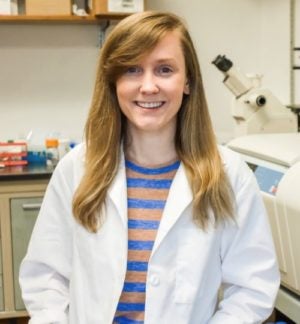 Kate Still’s article, How I Got Through My Grad School Slump, was published in the February 13th “Working Life” column in Science Magazine.
Kate Still’s article, How I Got Through My Grad School Slump, was published in the February 13th “Working Life” column in Science Magazine.
The article shared how she adjusted her mindset and developed resilience after initially failing her dissertation proposal defense at the start of her fourth year. Kate went on to pass her second proposal defense 5 months later.
We asked Kate to share more about why she pursued the article, her research and her hopes for the future. Here’s what she said.
What led you to write the article?
“I realized that I learned a very important lesson this year that I kept returning to – to focus more on my efforts than on external proof of my efforts. I think this is an especially important concept in science, because unlike many other career paths, effort does not always lead to forward movement or validation. I found myself giving this advice to any peers that were struggling, and I wanted to share the message with whomever I could. I wish, as students, we talked about these things more. I hoped that the article would help anyone going through a rut to feel less alone, and to share with them a mindset that has boosted my productivity. Besides trying to reach a broader audience of students, I decided to pursue publication of the article because I have always enjoyed writing and reflecting.”
Tell us about your research in the Tajie Harris Lab.
“Generally, our lab studies how infection of the brain is controlled, using the parasite Toxoplasma gondii as a model pathogen. In particular, my project focuses on how damage to brain cells caused by T. gondii infection can signal to recruit immune cells circulating in the blood to come into brain tissue and control pathogen.”
What do you hope to do in the future?
“This is unusual for me, because I often plan years in advance, but I’m not sure yet. My favorite part of my Ph.D. has been communicating science, connecting with other students, and reflecting on how science actually gets done –the funding process, the publishing process, and the mentoring of young scientists. I could see myself in a position that uses these skills/interests, such as science writing, medical-science liaising, science policy, etc. Whatever I do next, even if an academic postdoc, since I still love the bench, I hope to be an advocate for science and for scientists.”
